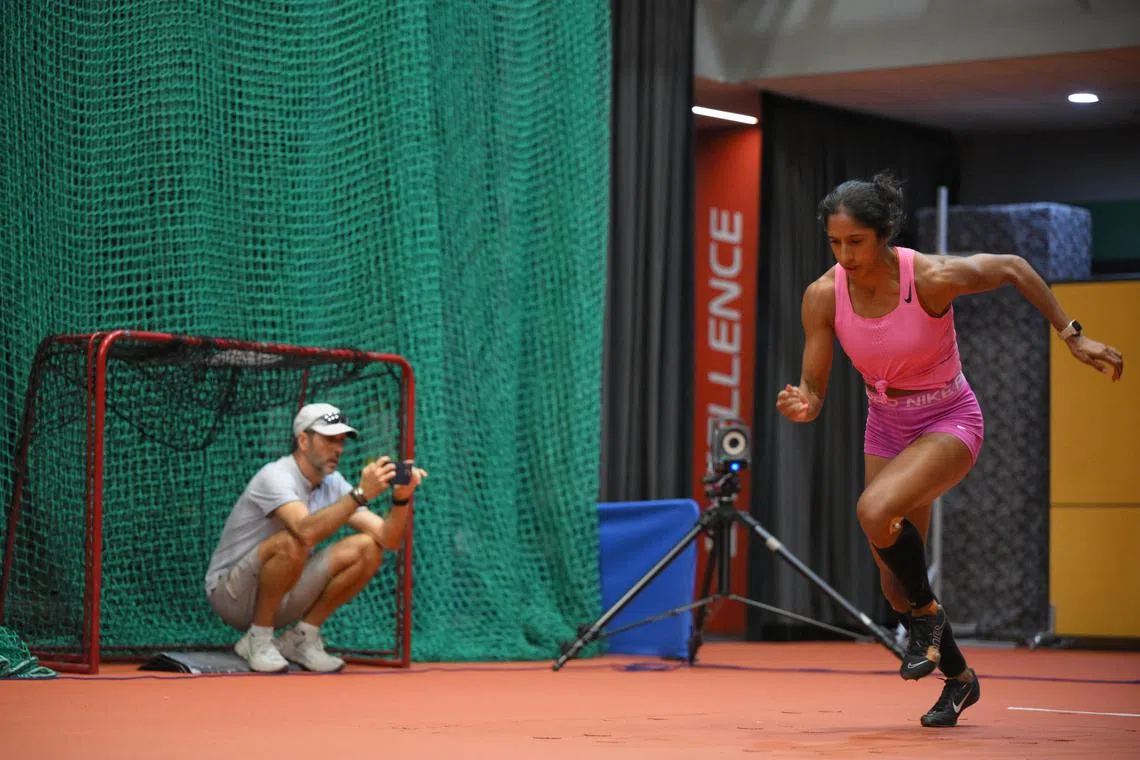Trust Your Spark
For Singapore sprinter Shanti Pereira and her coach, perfect chemistry is the formula for speed
In a six-part series, The Straits Times profiles people who have made an impact in various fields by trusting their instincts and keeping faith in their skills. In this first instalment, assistant sports editor Rohit Brijnath speaks to sprinter Shanti Pereira and her coach Luis Cunha about the unshakeable faith they have in each other.
Sign up now: Get ST's newsletters delivered to your inbox

Coach Luis Cunha keeps a close eye on Shanti Pereira's technique during a training session.
ST PHOTO: MARK CHEONG
Follow topic:
When she hears the question, Shanti Pereira’s face transforms. It radiates energy and brightens. She’s smiling, you see, and it’s like a joyous light has been turned on.
“Oh gosh,” she says.
“One thing I don’t like about him?”
“Him” is her coach Luis Cunha, who is sitting next to her in the air-conditioned gym at Home of Athletics on a sweltering May day. He – beard trimmed and manner thoughtful – resembles a greying academic. She, all lean muscle, has the relaxed ease of a resting greyhound.
In 40 minutes, the newly crowned Sportswoman of the Year and the Coach of the Year will be out there again, straining in the sun, their lives urgent because, in their world, time is always ticking. Already he’s sending her texts every morning with pictures of the Eiffel Tower and the number of days left until the Paris Olympics. His message is clear. Soyez prete. Be ready.
Only a race has a finish line, speed does not. You can always be faster and so “push” is his daily hymn. A pushing so profound that in the 4½ years of his coaching, in a sport measured in fractions, a once-stagnant sprinter has leapt whole numbers. From 23.60 seconds in the 200m to 22.57. If she’s the powerful, gifted engine, he’s the mechanic. A thoughtful one but also, er, pushy.
It’s why she laughs when asked what she doesn’t like about him.
“He nags a lot.”
His face wears a quizzical look. He’s a multilingual European, who speaks Portuguese, Spanish, French and English with varying fluency, but this particular word is foreign to him.
Naggy? What is naggy, he asks.
She explains, and he understands. This is his job: to repeat, to demand, to find from her that little extra.
“I know this can be annoying,” he explains. “If I tell her to push, she sometimes says,” – imitating her tone of exasperation – “‘I’m pushing.’ Okay, but you need to push more.”
But wait, Shanti, what do you like about him?
She pauses.
She’s taking a long time, I tease Cunha.
He grins. “It’s because there are so many things.”
She agrees, suddenly serious. “He’s passionate, he is detail-oriented, he is very knowledgeable and very kind... He accepts me for who I am and the fact I’m not just an athlete but I’m a human, too.” She’ll have bad days, slow days, emotionally fragile days, but he’s always there.
It’s an afternoon full of fondness and familiarity; one person starting a thought, the other completing it. These are two humans, one 59, the other 27, from different lands, who’ve placed their trust in each other. He has faith that she has the potential and will. She has faith that he makes her better. If her speed is the fire, this chemistry is the spark.
Life is mostly not a solitary endeavour and, if we’re lucky, it is enriched by relationships and collaboration. Billie Eilish and her brother Finneas create songs, the caddie and the golfer plot victory. Trust works like an epoxy here, as diverse talents are bound by respect. The pairs skater flying high in the air just knows her partner’s arms will catch her as she falls.
When the English rowers Matthew Pinsent and Steve Redgrave, who won two Olympic golds together, were first considered as a pair, they were sent out for a practice. Go, see, do you fit? Pereira and Cunha do; pieces of the same jigsaw, who don’t always agree but never forget to listen.
The teacher has always been at the heart of human blossoming. Alexander the Great was tutored by Aristotle, while Luke Skywalker received instruction from the delightful Yoda. But in sport, this relationship has a more persistent intensity. A musical mentor may attend the concert of his prodigy, but the coach-athlete travel together for miles and months, building trust over time and distance and defeat and victory.
But this touring comes with its own rules that involve, as Cunha says, giving “space to each other”. Pereira offers an example: “Outside of training, that’s when he does all his research. But I have a cut-off time. I’m, like, this is non-track time.” The athlete has to decompress, to separate herself from a world of spikes and starts. That they find this balance speaks of clarity and honesty.
Chemistry is a word casually tossed around, but sport demands evidence. Show us results. Let’s see timings. In a pre-Cunha era, Pereira won a single SEA Games gold in 2015. Since their partnership began in 2020, she owns a stuffed vault, with three SEA Games golds, two Asian Championships golds, Asian Games gold and silver, and qualification for the 2024 Paris Olympics.
This improvement is the offspring of precise engineering – a foot positioned differently, a polished lunge at the finish – but it’s also about Cunha rewiring her mindset.
“Everything to do with training, it’s a huge, big transformation,” says Pereira. “But also he has influenced my lifestyle now... Being an athlete is a 24/7 thing. I didn’t use to think that last time. Now I do, and it’s really because of him.”
Cunha emphasised the value of recovery, of eating properly, of sleeping well. The last one means a dark room, no caffeine eight to 10 hours before sleep, no screens one hour before bed, the phone on flight mode – all these tiny things that add up to the single thing they chase. Speed.
As the interview ends, they saunter out. The heat is grim. Her injured leg is still healing. But Paris is two months away and the clock never waits for anyone. Her life is relentless – so much labour invested for 22-plus seconds of work, so much pain worn – and yet always he’s her reassurance.
“I am maybe the only person,” Cunha says, “who saw her in her lowest moments and best moments.” She nods quietly beside him. Her tears, her anxiety, her joy, all this raw emotion only he knows.
But he also sees from close up the strength that courses through her, the ambition, the devotion. Which is why when I ask him what her best quality is, Cunha chooses a wonderful word.
Except that it takes a while to interpret it.
“Grift,” he says.
Grift? We wonder.
The unselfish Portuguese coach is an expert in the language of speed, not English. So carefully he spells out for us the word which for him defines the Singaporean with the famously fast feet.
G-R-I-T.



